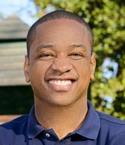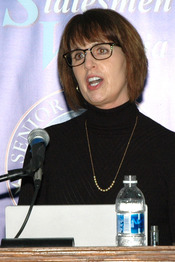Candidates Forum: Albemarle County Board of Supervisors & Albemarle County School Board
Thursday, October 12th, 2017Candidates for contested Albemarle County Board of Supervisors and School Board seats shared their views and responded to questions from the audience at this Senior Statesmen of Virginia sponsored forum.

First SSV Board Member Terry Cooper moderated the Board of Supervisors forum. Then SSV Vice President Rich DeMong moderated the School Board forum (shown above). Listen to the event via podcast.
The following candidate information is excerpted from the candidates’ campaign websites.
Candidates For Albemarle County Board Of Supervisors Samuel Miller District
 John Lowry (R) lives in North Garden. His background is in financial management. He is also a former chair of the Albemarle County Economic Development Authority. John is a runner and a member of the Albemarle Pipes and Drums Corps.
John Lowry (R) lives in North Garden. His background is in financial management. He is also a former chair of the Albemarle County Economic Development Authority. John is a runner and a member of the Albemarle Pipes and Drums Corps.
 Liz Palmer (D), the incumbent supervisor seeking a second term, lives in Ivy. She is a graduate of Virginia Tech and the Auburn University Veterinary School. She served as chair of the Board in 2016. She operates a veterinary hospice for companion animals.
Liz Palmer (D), the incumbent supervisor seeking a second term, lives in Ivy. She is a graduate of Virginia Tech and the Auburn University Veterinary School. She served as chair of the Board in 2016. She operates a veterinary hospice for companion animals.
Candidates For Albemarle County School Board Rio District
 Katrina Callsen is a graduate of Yale, the Boston University School of Education and U.Va. Law. She is a former teacher with Teach for America. She volunteers with Kids Give Back.
Katrina Callsen is a graduate of Yale, the Boston University School of Education and U.Va. Law. She is a former teacher with Teach for America. She volunteers with Kids Give Back.
 Mary McIntyre is an alumna of UNC — Greensboro who holds master’s degrees from the University of Michigan and the University of Hawaii — Manoa. She has taught in North Carolina, Virginia and Hawaii and volunteered at a school in Tanzania.
Mary McIntyre is an alumna of UNC — Greensboro who holds master’s degrees from the University of Michigan and the University of Hawaii — Manoa. She has taught in North Carolina, Virginia and Hawaii and volunteered at a school in Tanzania.
Candidates For Albemarle County School Board Samuel Miller District
 Graham Paige, the incumbent seeking his first full term, resides in Esmont. He is a graduate of Hampton University with a master’s degree from the University of Virginia. He is a retired Albemarle County teacher. He is a trustee, adult Sunday-School teacher and organist at New Green Mountain Baptist Church.
Graham Paige, the incumbent seeking his first full term, resides in Esmont. He is a graduate of Hampton University with a master’s degree from the University of Virginia. He is a retired Albemarle County teacher. He is a trustee, adult Sunday-School teacher and organist at New Green Mountain Baptist Church.
 Julian Waters is a 2017 graduate of Western Albemarle making his first run for elective office. He is active in education-policy issues and a regular blood donor who founded the Model Aviations and Drone Club at Western Albemarle.
Julian Waters is a 2017 graduate of Western Albemarle making his first run for elective office. He is active in education-policy issues and a regular blood donor who founded the Model Aviations and Drone Club at Western Albemarle.
The event took place on Wednesday October 11, 2017 meeting of the Senior Statesmen of Virginia. The meeting was held at the Senior Center in Charlottesville.
Program Summary
This is the third time Board of Supervisors hopeful John Lowry, a Republican, and incumbent Democrat Liz Palmer have faced off at a campaign forum this election cycle. Lowry said that he “was chair of the airport board when the new airport was being built and was chair of the economic development authority for 12 years.” “I am running for office because I believe I can better represent the constituents’ interests in the Samuel Miller District.”
“I’m having such a good time and feel we’ve done a good job and I want to continue,” Palmer said. “When I moved here I was struck by the condition of our water infrastructure, which is where our built environment meets the natural environment.”
After about 45 minutes, the event shifted over to the two contested School Board races.
Katrina Callsen and Mary McIntyre met for the first time in a campaign forum in their race to succeed Pam Moynihan for the Rio District’s School Board seat.
Graham Paige, the incumbent School Board member for the Samuel Miller District, answered questions alongside challenger Julian Waters, a 2017 graduate of Western Albemarle High School.


 Steve Landes (R)
Steve Landes (R) Angela Lynn (D)
Angela Lynn (D) Rob Bell (R)
Rob Bell (R) Kellen Squire (D)
Kellen Squire (D)





 In addition to leading the discussion, Supervisors Diantha McKeel, Chair of the Board and Supervisor for the Jack Jouett District, and Brad Sheffield, Supervisor for the Rio District, also answered questions from the audience. The program was moderated by SSV Vice President Rich DeMong.
In addition to leading the discussion, Supervisors Diantha McKeel, Chair of the Board and Supervisor for the Jack Jouett District, and Brad Sheffield, Supervisor for the Rio District, also answered questions from the audience. The program was moderated by SSV Vice President Rich DeMong.



 Luke Juday is director of planning for the
Luke Juday is director of planning for the  Carolyn Engelhard, who is the director of the Health Policy Program in the Department of
Carolyn Engelhard, who is the director of the Health Policy Program in the Department of  Kristen Suokko served as Board of Directors chairwoman of the Local Food Hub in 2012, and in 2013 became executive director. Kristen spoke at our February meeting on the value of fresh, farm sourced food from local farms. The program was moderated by SSV board member Madison Cummings. Listen to her presentation via podcast.
Kristen Suokko served as Board of Directors chairwoman of the Local Food Hub in 2012, and in 2013 became executive director. Kristen spoke at our February meeting on the value of fresh, farm sourced food from local farms. The program was moderated by SSV board member Madison Cummings. Listen to her presentation via podcast. Marshie Agee is the communication liaison for the
Marshie Agee is the communication liaison for the